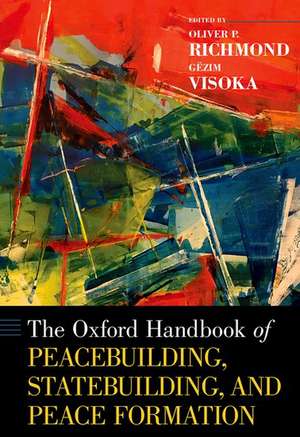The Oxford Handbook of Peacebuilding, Statebuilding, and Peace Formation: Oxford Handbooks
Editat de Oliver P. Richmond, Gëzim Visokaen Limba Engleză Hardback – 5 oct 2021
Din seria Oxford Handbooks
-
 Preț: 236.89 lei
Preț: 236.89 lei - 23%
 Preț: 855.11 lei
Preț: 855.11 lei - 29%
 Preț: 859.35 lei
Preț: 859.35 lei - 12%
 Preț: 308.25 lei
Preț: 308.25 lei - 23%
 Preț: 1052.07 lei
Preț: 1052.07 lei - 33%
 Preț: 725.45 lei
Preț: 725.45 lei - 15%
 Preț: 273.41 lei
Preț: 273.41 lei - 29%
 Preț: 1083.61 lei
Preț: 1083.61 lei - 14%
 Preț: 278.15 lei
Preț: 278.15 lei - 13%
 Preț: 304.38 lei
Preț: 304.38 lei - 15%
 Preț: 314.19 lei
Preț: 314.19 lei - 29%
 Preț: 931.18 lei
Preț: 931.18 lei - 25%
 Preț: 829.05 lei
Preț: 829.05 lei - 17%
 Preț: 912.51 lei
Preț: 912.51 lei - 24%
 Preț: 1071.82 lei
Preț: 1071.82 lei - 11%
 Preț: 258.04 lei
Preț: 258.04 lei - 26%
 Preț: 1376.97 lei
Preț: 1376.97 lei - 15%
 Preț: 357.85 lei
Preț: 357.85 lei - 30%
 Preț: 842.04 lei
Preț: 842.04 lei -
 Preț: 303.54 lei
Preț: 303.54 lei -
 Preț: 487.85 lei
Preț: 487.85 lei - 17%
 Preț: 260.81 lei
Preț: 260.81 lei - 21%
 Preț: 359.87 lei
Preț: 359.87 lei - 12%
 Preț: 267.23 lei
Preț: 267.23 lei - 33%
 Preț: 815.51 lei
Preț: 815.51 lei - 6%
 Preț: 346.76 lei
Preț: 346.76 lei - 30%
 Preț: 1065.79 lei
Preț: 1065.79 lei - 29%
 Preț: 930.94 lei
Preț: 930.94 lei -
 Preț: 263.30 lei
Preț: 263.30 lei - 22%
 Preț: 1095.69 lei
Preț: 1095.69 lei - 14%
 Preț: 987.01 lei
Preț: 987.01 lei - 21%
 Preț: 863.60 lei
Preț: 863.60 lei - 15%
 Preț: 358.80 lei
Preț: 358.80 lei - 16%
 Preț: 264.39 lei
Preț: 264.39 lei - 23%
 Preț: 839.90 lei
Preț: 839.90 lei - 34%
 Preț: 929.22 lei
Preț: 929.22 lei - 29%
 Preț: 855.42 lei
Preț: 855.42 lei - 33%
 Preț: 737.68 lei
Preț: 737.68 lei - 16%
 Preț: 263.35 lei
Preț: 263.35 lei - 29%
 Preț: 942.77 lei
Preț: 942.77 lei - 20%
 Preț: 343.85 lei
Preț: 343.85 lei - 26%
 Preț: 342.76 lei
Preț: 342.76 lei - 13%
 Preț: 264.87 lei
Preț: 264.87 lei - 30%
 Preț: 818.12 lei
Preț: 818.12 lei - 30%
 Preț: 815.25 lei
Preț: 815.25 lei - 25%
 Preț: 366.95 lei
Preț: 366.95 lei - 33%
 Preț: 861.04 lei
Preț: 861.04 lei - 12%
 Preț: 250.34 lei
Preț: 250.34 lei
Preț: 789.80 lei
Preț vechi: 1025.71 lei
-23% Nou
Puncte Express: 1185
Preț estimativ în valută:
151.18€ • 158.82$ • 127.05£
151.18€ • 158.82$ • 127.05£
Carte disponibilă
Livrare economică 18 februarie-04 martie
Livrare express 04-08 februarie pentru 52.29 lei
Preluare comenzi: 021 569.72.76
Specificații
ISBN-13: 9780190904418
ISBN-10: 0190904410
Pagini: 704
Dimensiuni: 188 x 249 x 58 mm
Greutate: 1.29 kg
Editura: Oxford University Press
Colecția OUP USA
Seria Oxford Handbooks
Locul publicării:New York, United States
ISBN-10: 0190904410
Pagini: 704
Dimensiuni: 188 x 249 x 58 mm
Greutate: 1.29 kg
Editura: Oxford University Press
Colecția OUP USA
Seria Oxford Handbooks
Locul publicării:New York, United States
Recenzii
The scholarly ambition, conceptual innovation, and intellectual energy of this Handbook make it a helpful tool on which to ride the vast expanses of knowledge on peacebuilding and statebuilding...this open-ended...finale is an apt reminder that peacebuilding's greatest strength-namely, its heterogeneity and the variety of approaches it generates-can also be its biggest weakness.
Notă biografică
Oliver P. Richmond is a Research Professor in International Relations, Peace and Conflict Studies in the Department of Politics at the University of Manchester, UK. He is International Research Professor at Dublin City University, Ireland; Distinguished Visiting Professor at the University of Tubingen, Germany; and a Visiting Professor at the University of Coimbra, Portugal. His publications include Grand Design: The Evolution of the International Peace Architecture, Peace Formation and Political Order in Conflict Affected Societies, and Failed Statebuilding. He is editor of the Palgrave book series Rethinking Peace and Conflict Studies and co-editor of the journal Peacebuilding.Gëzim Visoka is Associate Professor of Peace and Conflict Studies in the School of Law and Government at Dublin City University. His research focuses on post-conflict peacebuilding and statebuilding, transitional justice, global governance, foreign policy, and diplomatic recognition. He isthe co-author of Normalization in World Politics (with Nicolas Lemay-Hébert), and lead co-editor of the Routledge Handbook of State Recognition (with John Doyle and Edward Newman). He is editor of Routledge Studies in Statehood and deputy editor of the journal Peacebuilding.
